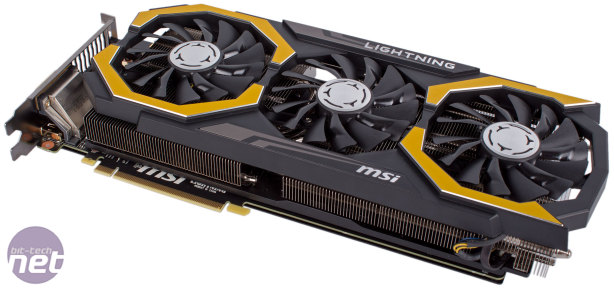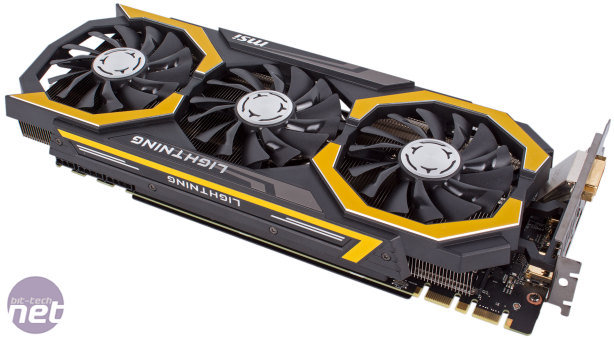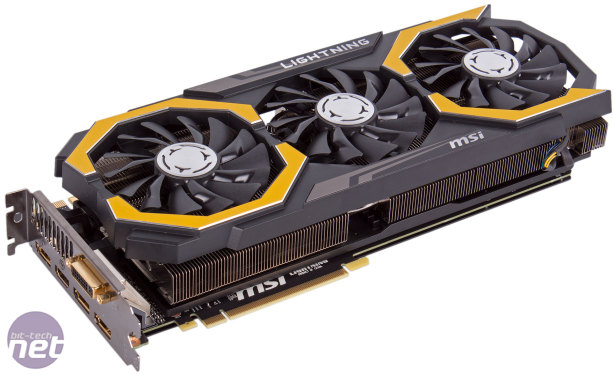
Performance Analysis
Examining average frame rates across the games shows that the MSI Lightning card is close to (but not quite) 10 percent quicker than the Asus GTX 980 Ti Poseidon – in some games this may be due to us using slightly newer drivers but it will mostly be down to the faster core clock speed, of course. Compared to a reference GTX 980 Ti, the Lightning is 14 percent quicker at 1440p and 16 percent at 4K. The closest competition from AMD is the Fury X, but the GTX 980 Ti Lightning won't be touched – it's 25 percent quicker on average at 1440p, although the lead drops to 20 percent at 4K, the resolution most suited to the Fury X. At £630, the MSI card is 20-25 percent more expensive than a Fury X, so the pricing isn't completely removed from the price-performance curve in the way that a Tian X is, for example.The minimum frame rates tell us that this card provides a sublime experience at 1440p – it manages a minimum of more than 60fps in every single test at this resolution, and as a single GPU card it comes without the increased risk of stuttering that SLI can induce. Admittedly, we don't test with every single setting maxed out in some of the games, but for high detail, >60fps 1440p gaming this is the sort of card you need to be looking at.
4K is still an extremely demanding test for GPUs, no matter how powerful they are, but the GTX 980 Ti Lightning is leading the way here too, hitting a minimum of between 30 and 60fps in every game, making it ripe for pairing with a 4K G-Sync screen.
Despite the hefty overclock, our system power consumption was only a little higher using this card than when using a reference one, suggesting that the power delivery here is indeed more efficient. It's also far more efficient than the R9 Fury X, consuming 10W less while being significantly faster. The custom cooler strikes a good balance between temperatures and noise – the Gigabyte GTX 980 Ti G1 Gaming is the only card to have been cooler, and even then only by a pretty meaningless 1°C, and it was also louder than this card, which was barely audible under load. Sadly, we did hear a bit of power noise in some situations – not what we were expecting from a card of this calibre, to be honest.
It seems that, on air cooling at least, getting a GTX 980 Ti to boost consistently past 1,450MHz will require a fair bit of luck. For all its extra power phases and digital voltage control, the boost speed of the GTX 980 Ti Lightning when overclocked was no better than what we've seen in any of the other GTX 980 Ti SKUs we've seen. That said, this card is more than ready for more extreme cooling methods and has had professional overclockers influence its design.
Still, we did manage to squeeze an extra bit of performance from the card – between 6 and 10 percent depending on the benchmark. Clearly, the extended power limit and memory overclock are both helping out, as the overclock we managed on the core was only around 3 percent, showing just how close MSI is running this card to peak performance. Power consumption did rise to 478W when the card was overclocked, but given the performance on offer a sub-500W result here is respectable.
Conclusion
Cards like this are a feat of engineering more than anything else, though that's not to say the GTX 980 Ti Lightning isn't highly desirable – just look at those performance figures if you need reminding. However, as things like the dual digital PWM voltage controllers, the LN2 switch and the voltage readout points make clear, this card is really targeting a niche within a niche; those looking to push frequencies to the absolute maximum with sub-zero cooling. It's the sort of card you'll see in overclocking competitions. If that's the sort of thing you're into, then the GTX 980 Ti Lightning does make sense and is likely to appeal – remember also that overclocking performance on air is no real indicator of performance on LN2.However, if you're sticking to air or even water-cooling, there are more suitable cards even if you are looking to blow the budget, as many of the features and much of the engineering here will just be going to waste. You can buy other GTX 980 Ti cards with very similar factory overclocks for a lot less, and most will only occupy two expansion slots unlike this one. Still, it's hard not to like a card of this calibre and there are very few criticisms we can level at it – it's well deserving of our Extreme Ultra award.

-
Performance40 / 40
-
Features29 / 30
-
Value17 / 30


MSI MPG Velox 100R Chassis Review
October 14 2021 | 15:04











Want to comment? Please log in.